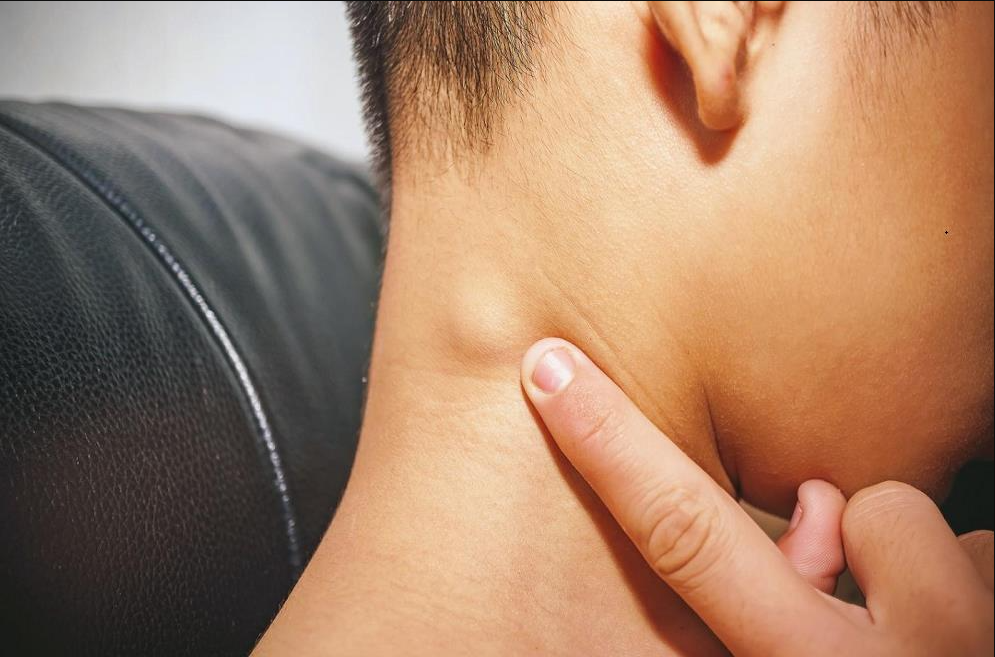Can Seasonal Allergies Cause Swollen Lymph Nodes in Neck?
As the seasons change, many individuals find themselves combatting the sniffles, itchy eyes, and a spectrum of other symptoms that hail the arrival of seasonal allergies. However, one symptom often goes under-discussed: the condition of swollen lymph nodes in the neck.
Could a rise in pollen count or a reaction to mold translate to a lymphatic response in our bodies? Medical professionals observe that individuals frequently query, “Can allergies cause swollen lymph nodes?” reaching out for clarity on this lesser-known signal of the body’s immune engagement.
Understanding the nexus between one’s environment and health is crucial, especially when distinguishing the swellings that accompany colds from those potentially linked to allergens.
Lymph nodes, critical components of the immune system, act as filters and become inflamed when responding to various intruders, encompassing not only microbes but also allergens. This prelude invites an exploration into the subtle ways our bodies may react to the seemingly innocuous seasonal shifts.
Key Takeaways
- Seasonal allergies may trigger an immune response resulting in swollen lymph nodes in the neck.
- The immune system’s activation and consequent lymphatic response to allergens can cause noticeable swelling.
- Distinguishing the swelling caused by allergies from other conditions is crucial for accurate diagnosis and treatment.
- Medical professionals, especially allergists, and immunologists, can provide insights into the link between allergies and lymph node inflammation.
- Recognizing the symptoms unique to allergic reactions helps in understanding when to seek medical attention.
Understanding the Link Between Seasonal Allergies and Lymph Node Swelling
When considering the question, can swollen lymph nodes be caused by allergies, it’s essential to examine the immune system’s role in this phenomenon. Allergic reactions are, at their core, an immune system response to what it perceives as a threat.
Common airborne allergens like pollen, dust mites, and pet dander infiltrate the body’s defenses, triggering a release of histamine and other chemicals designed to combat these intruders.
It’s this histamine release during an allergic reaction that can contribute to the symptoms of an allergy, one of which is lymph node swelling. Histamine increases the permeability of the capillaries to white blood cells and some proteins, to allow them to engage pathogens in the infected tissues.
Lymph nodes, as hubs of immune activity, can become swollen in the effort to filter out the allergens or the cells affected by the allergy.

In understanding lymph node swelling, it’s also critical to consider the differentiation between normal immune system processes and those that might indicate an allergic response.
For instance, while infections, such as the common cold, can cause lymph nodes to swell as the node produces more white blood cells to fight off the infection, allergies can provoke a similar response due to the body misidentifying a harmless substance as a harmful one.
According to the American Academy of Allergy, Asthma & Immunology, lymph node swelling can indeed be a consequence of an allergic reaction, particularly if the allergen is something the patient frequently encounters, like certain pollens during spring.
Lymph nodes are small, bean-shaped structures that produce and store cells that help fight infection, including lymphocytes (a type of white blood cells) and macrophages. When an individual with allergies comes into contact with an allergen, their immune system might ramp up the production of antibodies and escalate the activity within the lymph nodes, leading to noticeable lymph node swelling.
The information compiled from a breadth of immunology research papers delineates how an allergic reaction’s typical signs—rash, sneezing, itching, and swollen lymph nodes—are all underpinned by the immune system’s endeavor to protect the body. It is this very response—meant to defend—that can result in discomfort and the requirement for medical intervention.
Finally, the correlation between allergies and lymph node swelling underscores the capability and complexity of our immune system. While often inconvenient, this response is a testament to our body’s constant vigilance against potential threats, whether they be actual infections or perceived dangers such as allergens.

Identifying Symptoms: Swollen Lymph Nodes in the Context of Allergies
When the delicate balance of the body’s immune system encounters airborne irritants, the question often arises—can seasonal allergies cause swollen lymph nodes in neck or under the jaw? Recognizing the hallmark signs of lymphatic swelling due to allergies is key in distinguishing these from symptoms of other health issues.
Allergic reactions frequently trigger an increase in size and tenderness of lymph nodes, especially those located in the neck and sometimes under the jaw. This swelling is typically accompanied by other allergic symptoms such as sneezing, a runny nose, or itchy eyes.

The texture of the swollen lymph nodes in allergic reactions is generally softer and these may be painful when touched. Unlike the firmness observed in more serious conditions, allergy-related swelling is often transient, aligning with exposure to the allergens.
The duration of swollen lymph nodes due to allergies can last as long as the exposure continues, but will typically recede with the reduction or removal of the allergen. In distinguishing allergy-related lymph swelling from other causes, it’s crucial to observe the timing and correlation with allergy season or specific exposure to known irritants.
It’s prudent for individuals to seek medical attention if the swelling persists or is associated with systemic symptoms like fever, night sweats, or unexplained weight loss. Medical professionals often conduct a thorough assessment, which can include reviewing one’s medical history for allergy patterns, performing physical examinations, and possibly ordering diagnostic tests.
Treatment for swollen lymph nodes connected to allergies generally involves managing the allergic reaction through avoidance strategies and medications tailored to alleviate the symptoms. Should you recognize signs of persistent swelling, especially if not clearly linked to allergies, the expertise of a healthcare provider becomes invaluable in ruling out other medical concerns.
FAQ
Can allergies cause swollen lymph nodes?
Yes, allergies can cause swollen lymph nodes as a part of the body’s immune response to the allergen. When the immune system detects an invader, like pollen or pet dander, it may activate the lymph nodes to produce cells that help fight off the allergens, resulting in swelling.
What are swollen lymph nodes in the neck?
Swollen lymph nodes in the neck, also known as cervical lymphadenopathy, are enlargements of the lymph nodes that can occur due to a variety of health conditions, including infections, inflammation, and in some cases, seasonal allergies. These nodes are part of the lymphatic system, crucial for immune function and waste removal.
How does the immune system react to seasonal allergies?
In the case of seasonal allergies, the immune system mistakes harmless airborne substances like pollen for dangerous invaders. It launches a defense by releasing chemicals such as histamines, which can lead to inflammation and swelling of the lymph nodes, specifically in the neck region as the body attempts to filter out the allergens.
Can swollen lymph nodes be caused by allergies?
Indeed, swollen lymph nodes can be a result of allergies. When the immune system is activated during an allergic reaction, it can cause the lymph nodes to swell as they work to produce immune cells and antibodies to combat the allergens.
What is the link between histamine release and lymph node swelling?
Histamine release occurs during an allergic reaction and is part of the body’s inflammatory response to an allergen. This release can lead to various symptoms, including the swelling of lymph nodes, as the histamine increases blood flow to the affected area and may cause an accumulation of immune cells, which contributes to the swelling.
How can one identify if swollen lymph nodes are due to seasonal allergies?
Swollen lymph nodes due to seasonal allergies are typically accompanied by other allergic symptoms such as sneezing, runny nose, and itchy eyes. The lymph nodes may be tender and swollen but generally are not extremely painful. If seasonal allergies are present and suspected to be the cause, a correlation might be observed with exposure to allergens.
Can allergies cause swollen lymph nodes under the jaw?
Allergies can potentially cause swollen lymph nodes under the jaw. The lymph nodes located in the submandibular region can react to allergens and become inflamed as the body’s immune system responds to the perceived threat.
When should one seek medical attention for swollen lymph nodes?
Medical attention should be sought if the swollen lymph nodes persist for more than a week or two, especially if they continue to enlarge or are accompanied by other concerning symptoms such as fever, night sweats, or unexplained weight loss.
If swollen lymph nodes are a regular occurrence during allergy season and are associated with typical allergy symptoms, it’s still best to consult a healthcare professional for a proper evaluation.
Are there treatments for swollen lymph nodes caused by allergies?
Treatments for swollen lymph nodes caused by allergies usually involve managing the underlying allergic reaction. This can include antihistamines to reduce the immune response, nasal corticosteroids for inflammation, and avoiding exposure to allergens.
In some cases, immunotherapy may be recommended. It’s important to consult with a healthcare provider to determine the best treatment plan for individual cases.
Let us know what do you think about this article and if you have any other questions about this the topic “can seasonal allergies cause swollen lymph nodes in neck” don’t hesitate to contact us.
Source links:

Leave a Reply